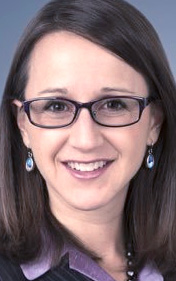

 The Internet is a great success and an abject failure. We need a new and better one. Let me explain why. We are about to enter an era when online services are about to become embedded into pretty much every activity in life. We will become extremely dependent on the safe and secure functioning of the underlying infrastructure. Whole new industries are waiting to be born as intelligent machines, widespread robotics, and miniaturized sensors are everywhere. more
The Internet is a great success and an abject failure. We need a new and better one. Let me explain why. We are about to enter an era when online services are about to become embedded into pretty much every activity in life. We will become extremely dependent on the safe and secure functioning of the underlying infrastructure. Whole new industries are waiting to be born as intelligent machines, widespread robotics, and miniaturized sensors are everywhere. more
 Let's be honest about it. Nobody -- including those very clever people that were present at its birth -- had the slightest idea what impact the internet would have in only a few decades after its invention. The internet has now penetrated every single element of our society and of our economy, and if we look at how complex, varied and historically different our societies are, it is no wonder that we are running into serious problems with the current version of our internet. more
Let's be honest about it. Nobody -- including those very clever people that were present at its birth -- had the slightest idea what impact the internet would have in only a few decades after its invention. The internet has now penetrated every single element of our society and of our economy, and if we look at how complex, varied and historically different our societies are, it is no wonder that we are running into serious problems with the current version of our internet. more
 What will the Internet look like in the next seven to 10 years? How will things like marketplace consolidation, changes to regulation, increases in cybercrime or the widespread deployment of the Internet of Things impact the Internet, its users and society? At the Internet Society, we are always thinking about what's next for the Internet. And now we want your help! more
What will the Internet look like in the next seven to 10 years? How will things like marketplace consolidation, changes to regulation, increases in cybercrime or the widespread deployment of the Internet of Things impact the Internet, its users and society? At the Internet Society, we are always thinking about what's next for the Internet. And now we want your help! more
China's government has established a 100 billion yuan (US$14.5 billion) state fund to invest, nurture and support internet companies and spearhead the country's technological innovations and economic transformation into the so-called 'Internet Plus' era. more
 In its bid to be free of U.S. government oversight ICANN is leaning on the global multistakeholder community as proof positive that its policy-making comes from the ground up. ICANN's recent response to three U.S. senators invokes the input of "end users from all over the world" as a way of explaining how the organization is driven. Regardless of the invocation of the end user (and it must be instinct) ICANN cannot seem to help reaching back and slapping that end user across the face. more
In its bid to be free of U.S. government oversight ICANN is leaning on the global multistakeholder community as proof positive that its policy-making comes from the ground up. ICANN's recent response to three U.S. senators invokes the input of "end users from all over the world" as a way of explaining how the organization is driven. Regardless of the invocation of the end user (and it must be instinct) ICANN cannot seem to help reaching back and slapping that end user across the face. more
 Verisign's spent the best part of 2016 putting out warnings. The .COM operator and domain industry heavyweight highlighted its Q3 earnings report with a stern "Ending Q4 '16 Domain Name Base expected to decrease by between 1.5M to 2.8M registrations from the end of Q3 '16". A forecast which the company said was based on "on historical seasonality and current market trends." As 2016 drew to a close, the downturn seemed to materialize... more
Verisign's spent the best part of 2016 putting out warnings. The .COM operator and domain industry heavyweight highlighted its Q3 earnings report with a stern "Ending Q4 '16 Domain Name Base expected to decrease by between 1.5M to 2.8M registrations from the end of Q3 '16". A forecast which the company said was based on "on historical seasonality and current market trends." As 2016 drew to a close, the downturn seemed to materialize... more
 I've discussed the role of the Internet in creating and propagating lies in a previous post, noting that Donald Trump lied more frequently than Hillary Clinton or Bernie Sanders during the campaign. Now let's look at fake news like the claim that Pope Francis had endorsed Trump. The fake post features the following image and includes a "statement" by the Pope in which he explains his decision. more
I've discussed the role of the Internet in creating and propagating lies in a previous post, noting that Donald Trump lied more frequently than Hillary Clinton or Bernie Sanders during the campaign. Now let's look at fake news like the claim that Pope Francis had endorsed Trump. The fake post features the following image and includes a "statement" by the Pope in which he explains his decision. more
 The victory of Trump left the world perplexed, it did not take long to appear texts blaming Facebook and its bubble for the unexpected result. The "bubble", a theme that circulated more for the academic and technical spheres gained an unusual popularity in the last days, never saw so many texts on the subject published in such a short space of time, and in the recognized spaces of global journalism. more
The victory of Trump left the world perplexed, it did not take long to appear texts blaming Facebook and its bubble for the unexpected result. The "bubble", a theme that circulated more for the academic and technical spheres gained an unusual popularity in the last days, never saw so many texts on the subject published in such a short space of time, and in the recognized spaces of global journalism. more
 Brands are an asset and have a value for organizations, as they generate revenue: Customers are happy to pay a premium for a brand they love. They will show a preference and be loyal to a brand they trust. There are various ways to estimate the value of a brand. An excellent point of reference is Interbrand, which for many years has followed the top 100 brands and publishes their value based on a combination of three factors. more
Brands are an asset and have a value for organizations, as they generate revenue: Customers are happy to pay a premium for a brand they love. They will show a preference and be loyal to a brand they trust. There are various ways to estimate the value of a brand. An excellent point of reference is Interbrand, which for many years has followed the top 100 brands and publishes their value based on a combination of three factors. more
 As I wrote in December 2015, some Internet commerce companies - including domain name registries, registrars, advertising providers, social media platforms, payment processors and shippers - are doing right by patients in taking voluntary action against illegal online drug sellers. This is no small feat as 97% of the roughly 35,000 active online drug sellers are operating illegally. more
As I wrote in December 2015, some Internet commerce companies - including domain name registries, registrars, advertising providers, social media platforms, payment processors and shippers - are doing right by patients in taking voluntary action against illegal online drug sellers. This is no small feat as 97% of the roughly 35,000 active online drug sellers are operating illegally. more
Electronic Frontier Foundation (EFF) released a letter today stating "companies and organizations that run the Internet's domain name system shouldn't be in the business of policing the contents of websites, or enforcing laws that can impinge on free speech. more
 On Tuesday, Twitter announced the creation of the Trust and Safety Council, a body comprising 40 organisations and individuals from civil society and academia, tasked with "ensur[ing] that people feel safe expressing themselves on Twitter". The move is clearly a response to specific criticism of Twitter and its perceived inadequacies in dealing with hate speech?-- a theme so popular and well-trodden that it recently spawned a parody account. more
On Tuesday, Twitter announced the creation of the Trust and Safety Council, a body comprising 40 organisations and individuals from civil society and academia, tasked with "ensur[ing] that people feel safe expressing themselves on Twitter". The move is clearly a response to specific criticism of Twitter and its perceived inadequacies in dealing with hate speech?-- a theme so popular and well-trodden that it recently spawned a parody account. more
 Since the launch of the New gTLD Program in 2012, it has become evident that new gTLD registries overestimated the demand for new Top-Level Domain name extensions. Furthermore, new gTLD registries did not anticipate the hurdles in raising awareness, not to mention creating adoption for new domains. Even the most pessimistic New gTLD Program critic did not expect such uninspiring results. It was a wake up call for many in the domain industry. The New gTLD Program currently lacks credibility. No new gTLD has yet to go mainstream and capture the world's imagination. more
Since the launch of the New gTLD Program in 2012, it has become evident that new gTLD registries overestimated the demand for new Top-Level Domain name extensions. Furthermore, new gTLD registries did not anticipate the hurdles in raising awareness, not to mention creating adoption for new domains. Even the most pessimistic New gTLD Program critic did not expect such uninspiring results. It was a wake up call for many in the domain industry. The New gTLD Program currently lacks credibility. No new gTLD has yet to go mainstream and capture the world's imagination. more
 As many internet industry participants would be aware, the development of the World Wide Web is attributed to a project team at the European Organization for Nuclear Research, commonly known as CERN. CERN, one of the world's largest and most respected centres for scientific research, is a leader in technological development and the furthering of our collective understanding of science and technology. more
As many internet industry participants would be aware, the development of the World Wide Web is attributed to a project team at the European Organization for Nuclear Research, commonly known as CERN. CERN, one of the world's largest and most respected centres for scientific research, is a leader in technological development and the furthering of our collective understanding of science and technology. more
In a large scale experiments, Russia has attempted to test the feasibility of cutting the country off the World Wide Web, according to reports. "The tests, which come amid mounting concern about a Kremlin campaign to clamp down on internet freedoms, have been described by experts as preparations for an information blackout in the event of a domestic political crisis." more